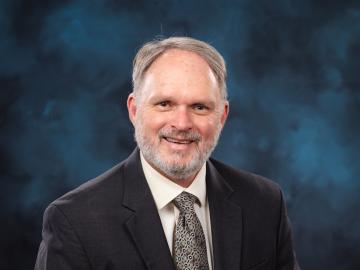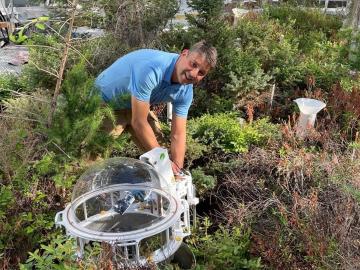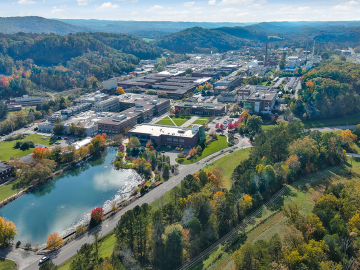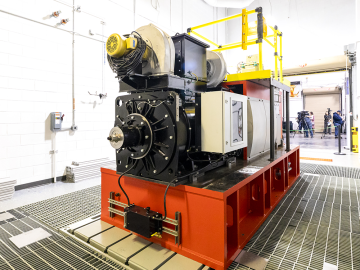
Filter News
Area of Research
- Advanced Manufacturing (3)
- Biology and Environment (27)
- Clean Energy (50)
- Climate and Environmental Systems (1)
- Computational Engineering (1)
- Fusion and Fission (4)
- Fusion Energy (1)
- Isotopes (2)
- Materials (44)
- Materials for Computing (7)
- National Security (11)
- Neutron Science (41)
- Nuclear Science and Technology (5)
- Supercomputing (32)
News Type
News Topics
- (-) Advanced Reactors (10)
- (-) Biomedical (17)
- (-) Clean Water (1)
- (-) Environment (36)
- (-) Frontier (14)
- (-) Machine Learning (13)
- (-) Neutron Science (49)
- (-) Polymers (12)
- (-) Sustainable Energy (31)
- 3-D Printing/Advanced Manufacturing (44)
- Artificial Intelligence (29)
- Big Data (8)
- Bioenergy (24)
- Biology (22)
- Biotechnology (7)
- Buildings (13)
- Chemical Sciences (29)
- Climate Change (22)
- Composites (9)
- Computer Science (57)
- Coronavirus (17)
- Critical Materials (11)
- Cybersecurity (17)
- Decarbonization (19)
- Education (3)
- Element Discovery (1)
- Energy Storage (41)
- Exascale Computing (9)
- Fossil Energy (1)
- Fusion (14)
- Grid (15)
- High-Performance Computing (26)
- Isotopes (17)
- ITER (2)
- Materials (59)
- Materials Science (50)
- Mercury (2)
- Microelectronics (1)
- Microscopy (16)
- Molten Salt (2)
- Nanotechnology (26)
- National Security (18)
- Net Zero (3)
- Nuclear Energy (26)
- Partnerships (27)
- Physics (24)
- Quantum Computing (9)
- Quantum Science (26)
- Renewable Energy (1)
- Security (11)
- Simulation (8)
- Space Exploration (3)
- Statistics (2)
- Summit (20)
- Transformational Challenge Reactor (4)
- Transportation (25)
Media Contacts

Mickey Wade has been named associate laboratory director for the Fusion and Fission Energy and Science Directorate at the Department of Energy’s Oak Ridge National Laboratory, effective April 1.

Oak Ridge National Laboratory scientists set out to address one of the biggest uncertainties about how carbon-rich permafrost will respond to gradual sinking of the land surface as temperatures rise.

A quest to understand how Sphagnum mosses facilitate the storage of vast amounts of carbon in peatlands led scientists to a surprising discovery: the plants have sex-based differences that appear to impact the carbon-storing process.

U2opia Technology, a consortium of technology and administrative executives with extensive experience in both industry and defense, has exclusively licensed two technologies from ORNL that offer a new method for advanced cybersecurity monitoring in real time.

Three scientists from the Department of Energy’s Oak Ridge National Laboratory have been elected fellows of the American Association for the Advancement of Science, or AAAS.

A partnership of ORNL, the Tennessee Department of Economic and Community Development, the Community Reuse Organization of East Tennessee and TVA that aims to attract nuclear energy-related firms to Oak Ridge has been recognized with a state and local economic development award from the Federal Laboratory Consortium.

Paul Langan will join ORNL in the spring as associate laboratory director for the Biological and Environmental Systems Science Directorate.

While studying how bio-inspired materials might inform the design of next-generation computers, scientists at ORNL achieved a first-of-its-kind result that could have big implications for both edge computing and human health.

Eight ORNL scientists are among the world’s most highly cited researchers, according to a bibliometric analysis conducted by the scientific publication analytics firm Clarivate.

As the United States shifts away from fossil-fuel-burning cars and trucks, scientists at the Department of Energy’s Oak Ridge and Argonne national laboratories are exploring options for another form of transportation: trains. The research focuses on zero-carbon hydrogen and other low-carbon fuels as viable alternatives to diesel for the rail industry.


